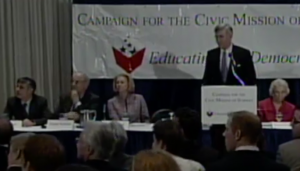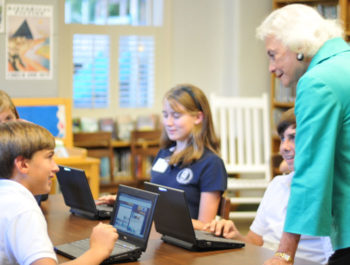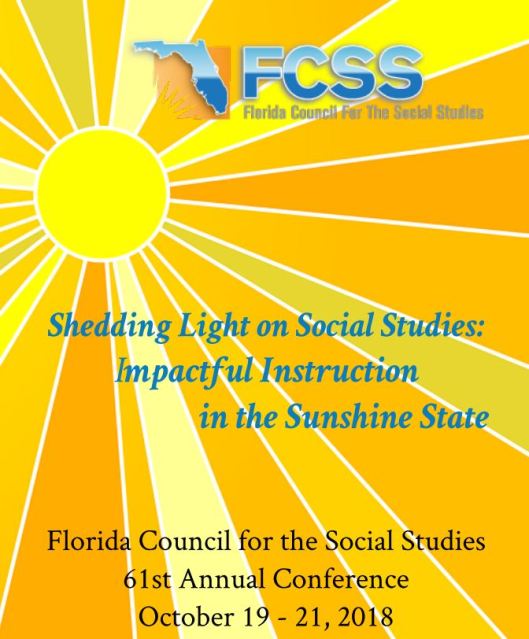At a recent meeting, we discussed people who should be encouraged to join the effort we were working on. We quickly listed demographic categories that we should pay attention to: race and ethnicity, gender and sexuality, age, class, ideology, partisanship, and religion.
I think these categories are important for outreach and recruitment–but importantly different.
Race, gender, and sexual orientation
Race, gender, and sexual orientation matter because we live in a society that is deeply unequal on those dimensions. Unless you seriously strive for equal representation, you are likely to end up with a panel or committee full of straight white men–and the more influential and prestigious the group is, the more that will be the outcome. Failing to address it preserves inequality.
A demographically homogeneous group may also lose the wisdom that comes from a wider range of perspectives and experiences, but to me, that is not an essential argument. Sometimes, adding racial or sexual/gender diversity won’t actually add relevantly different perspectives on the issue under discussion, but inclusion is still important for addressing inequality in the society as a whole. There is often also a pragmatic imperative for improving racial and gender representation. Without such diversity, a group looks illegitimate and can’t win the support it needs to move forward.
I would equate religion with race/ethnicity insofar as it’s an identity that provokes discrimination by others. As a set of beliefs about the world, a religion is more like an ideology, which I will address below.
Social class
Our society is also unequal by class, but this is different. Class is a name for social inequality. It doesn’t make sense to imagine a society with different classes that are equal to each other. If you have equality, you don’t have classes at all. However, it is not clear that a classless society can be accomplished. State communist societies produced the nomenklatura, a powerful new class or (as Trotsky thought) a caste composed of party officials and their families. According to Robert Michels, social democratic parties and unions quickly created “oligarchies” of professional organizers, notwithstanding their sincere commitments to equality. By virtue of being a union official instead of a unionized line worker, you are now part of a different class.
If you organize a meeting of people who hold a certain range of positions in society–a meeting of union leaders, or teachers, or leaders of nonprofit organizations, or college students, or miners–it will have a class “bias.” Yet surely there is value in such meetings. It wouldn’t be reasonable to argue, for example, that teachers should never organize except along with students, parents, and others. But if teachers organize, that is a middle class movement.
Therefore, it is a bit disingenuous to imagine that you can be “inclusive and diverse” with respect to class. But you can strive (1) to be inclusive of people who have various class origins and cultural markers of class, such as accents; and (2) to organize meetings and movements that engage grassroots participants, not merely leaders and experts. But (2) is hard. After, who will organize, pay for, and advertise the big meeting that is open to the public as a whole? Surely some kind of specialized subgroup will be responsible. Michels thought oligarchy was an “iron law,” and even if it’s less rigid than that, there is still a powerful tendency for people who hold certain social positions to run things. That’s what it means to have those positions.
Age
Age is different, too. We should be concerned about including younger people because we should be worried about future leadership and must create opportunities to learn and to develop power. But age equality is not like racial or gender equality. There are actual differences among people of different ages. For instance, senior managerial positions cannot be equally distributed between the young and old. It takes time to develop the experience, expertise, and connections that institutions need.
The House Democrats who will lead important committees if the party wins in November will include Elijah Cummings, age 67, Bennie Thompson, 70, Maxine Waters, 80, Nita Lowey, 81, and Eddie Bernice Johnson, 82. These are women or men of color who have waited a long time for gavels. To be sure, the party caucus could replace them with younger leaders who were also diverse, but these people’s claims to leadership rest on seniority, and that deserves consideration. I wouldn’t oppose replacing them with younger chairs, but I would insist that age is different from, say, race. It can be legitimate to consider seniority or experience.
Ideology, partisanship, and theology
It’s worth bearing in mind that our goal is to develop the right views so that we can do what is right. The right views are not equally consistent with all ideologies, party platforms, or applications of theology.
In pursuing the right views, we must be humble. It is very likely that each of us is wrong and that others are more right. So we must be open and interested in alternative views.
I am typically a mainstream liberal, center-left. I especially benefit from being an outlier in meetings that are dominated by libertarians/neoliberals or by radical proponents of identity politics. I don’t fully align with either position but always learn from them–usually more than I learn from hanging around other people with whom I easily agree.
Learning provides a rationale for philosophical diversity–but with important caveats. First, some alternative views are more worthy than others. I seek out libertarians but not Trump-supporters to learn from. That is a judgment, and it could be wrong, but it’s my best judgment at this moment. I don’t believe that I have anything whatsoever to learn from Donald Trump himself, yet more than 60 million Americans really like him. Demographic representativeness would argue for including Trump-supporters, but my judgment about how to learn does not.
Furthermore, the value of ideological diversity depends on the purpose of a meeting or event. If I am trying to advance an agenda, I want a majority of participants to share my considered views of the topic. I may value some minority views to keep us sharp, but I’d like the majority to agree with me. I can achieve that goal either by recruiting like-minded participants or by persuading other attendees to agree. I would never treat racial or gender/sexual diversity in a similar way, trying to stack the room with people who were like me. On the other hand, if my goal is to learn, I may prefer to be one of a few participants in a meeting dominated by people who oppose my views, so that I can get a full dose of their perspective.
Conclusion
In sum, race/ethnicity and gender/sexuality make powerful claims for equal representation. Class and age are more complicated; it can be disingenuous to imagine that a meeting can be egalitarian on those dimensions. And ideological diversity is not a good in itself, but intellectual humility and striving to learn are genuine goods that sometimes provide reasons to be ideologically inclusive.
The complication is that race and ethnicity, gender, age, religion, ideology and partisanship correlate in the population. Say you want a meeting of influential people who are in a position to allocate resources, but you also demand racial diversity in your meetings. The most influential people are likely to be predominantly white. Or say you’re a libertarian who is genuinely committed to racial equality (as some are). You’re entitled to form a committee of libertarians, but it’s your problem if they all turn out to be white men.
I think these points of conflict among different kinds of diversity generate some of the hardest issues, both ethically and pragmatically.
See also: what is privilege?; the rise of an expert class and its implications for democracy; to what extent can colleges promote upward mobility?; defining equity and equality; two approaches to social capital: Bourdieu vs. the American literature; and a college class on equality; when social advantage persists for millennia.
 Over 90 participants tuned in to learn more about Konveio and how we plan to use the platform to bring the conference guidebook to life for #NCDD2018. Because NCDD conferences are highly engaging experiences, and we are always seeking new ways to bring in new tools and processes, that’s why we teamed up with Konveio to enrich the experience of conference attendees with this interactive option of the guidebook (in addition to the hardcopy one we will provide in each participants’ tote bag when you arrive).
Over 90 participants tuned in to learn more about Konveio and how we plan to use the platform to bring the conference guidebook to life for #NCDD2018. Because NCDD conferences are highly engaging experiences, and we are always seeking new ways to bring in new tools and processes, that’s why we teamed up with Konveio to enrich the experience of conference attendees with this interactive option of the guidebook (in addition to the hardcopy one we will provide in each participants’ tote bag when you arrive). NCDD2018 will be from Friday, November 2 to Sunday, November 4th and is going to be a fantastic time for practitioners and enthusiasts of dialogue, deliberation, and engagement work to dig in together about how to build capacity for this work and amplify its usage. We hope you will consider joining us if you haven’t registered already so you can both experience this powerful event and have a real opportunity to use Konveio in action! Get your ticket for the whole conference or check out the single-day rate; and don’t forget to explore the pre-conference offerings happening on Thursday, November 1st, the day before NCDD2018 officially starts!
NCDD2018 will be from Friday, November 2 to Sunday, November 4th and is going to be a fantastic time for practitioners and enthusiasts of dialogue, deliberation, and engagement work to dig in together about how to build capacity for this work and amplify its usage. We hope you will consider joining us if you haven’t registered already so you can both experience this powerful event and have a real opportunity to use Konveio in action! Get your ticket for the whole conference or check out the single-day rate; and don’t forget to explore the pre-conference offerings happening on Thursday, November 1st, the day before NCDD2018 officially starts!


 I’m sorry to read that Justice O’Connor has dementia. She has devoted her retirement years to improving civics, and she has taken that objective fully seriously.
I’m sorry to read that Justice O’Connor has dementia. She has devoted her retirement years to improving civics, and she has taken that objective fully seriously.
 On October 18, 2018 at the National Conference in Citizenship in Washington, D.C., six inspiring initiatives were honored as winners of the 2018 American Civic Collaboration awards.
On October 18, 2018 at the National Conference in Citizenship in Washington, D.C., six inspiring initiatives were honored as winners of the 2018 American Civic Collaboration awards.
 Here’s what you need to know:
Here’s what you need to know:  Do not miss the plenaries! Our opening plenary will feature “lightning talks” by civic innovators to spark inspiration and will include a networking activity to assist every attendee with identifying goals for the conference and beyond. On Saturday and Sunday, we will be focusing the plenaries almost exclusively on connecting, by using Open Space and Pro Action Cafe, respectively, for folks to propose the topics and ideas they most want to connect with others about!
Do not miss the plenaries! Our opening plenary will feature “lightning talks” by civic innovators to spark inspiration and will include a networking activity to assist every attendee with identifying goals for the conference and beyond. On Saturday and Sunday, we will be focusing the plenaries almost exclusively on connecting, by using Open Space and Pro Action Cafe, respectively, for folks to propose the topics and ideas they most want to connect with others about! Today we are pleased to unveil a new and improved
Today we are pleased to unveil a new and improved